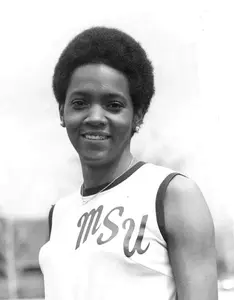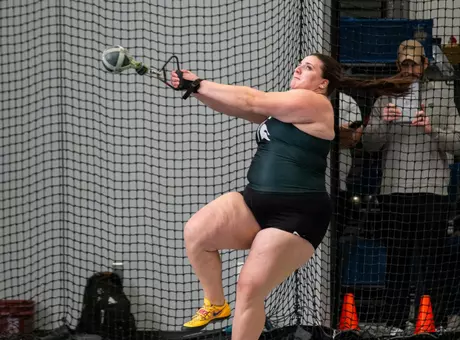Michigan State University Athletics

Karen Dennis: National Sprint Champ & Longtime Coach
2/15/2007 12:00:00 AM | Track and Field
Feb. 15, 2007
February is Black History Month, and nowhere in major-college athletics is that history richer than at Michigan State University. From Gideon Smith, the first African-American football player at Michigan Agricultural College in 1913, to Steve Smith, an All-American basketball player whose contributions have a major impact today, it would take many months to tell the full story. In a series of profiles, longtime Michigan State beat writer and columnist Jack Ebling will highlight some of the greatest of the great. The third of those stories is national sprint champ and longtime coach Karen Dennis.
KAREN DENNIS
All she needed was an inspiration. Then, Karen Dennis became one.
But if she hadn't bumped into Jim Bibbs at a youth track meet on Belle Isle at age 13, a lot of things would have been different.
Dennis wouldn't have been fifth in the 220-yard dash at the 1968 Olympic Trials.
She wouldn't have transferred to Michigan State and become a new program's first national champion.
She wouldn't have become a graduate assistant, then an assistant coach and finally the head women's track and field coach for the Spartans.
She wouldn't have become the head coach at UNLV, the leader of the 2000 U.S. Olympic Team or the head coach at Ohio State.
Most importantly, she wouldn't have been the same parent and person without the influence of a man she still calls "Mr. Bibbs" more than 40 years later.
And to think it all started with a disqualification.
"She won the race but ran out of her lane," Bibbs remembered Thursday. "I said, `I've got to find that child!' I had the Ecorse Track Club. And she was from Detroit. But when I found her, she was in her dad's car, crying. She couldn't understand why she'd won the race and had it taken away from her."
Dennis began to train with Bibbs' athletes at Ecorse High, though she soon went to Detroit Chadsey. By then, Dennis had discovered her niche.
"I finally found something I was good at," Dennis said Thursday morning from Columbus, Ohio. "I was afraid of the softball. I got hit in the head with a tennis racket. And I had track in my genes. My father was a high jumper. But it's amazing how people impact your life. If Mr. Bibbs hadn't knocked on my father's car door when I was crying, you never know what might've happened."
It didn't take Bibbs long to see that he'd stumbled upon someone special, on and off the track.
"I can still hear her say, `Dad, I'm going to have a real coach!'" Bibbs said of Dennis. "As a runner, she reminded me of the great Wilma Rudolph (a three-time Olympic champion). She had a nice, long stride and was very smooth. She was a sweet child, too - very coachable. But she was very competitive. Our relay team won five consecutive (AAU) national championships."
When meet organizers sent plane fare for Dennis to compete in their events around the country, she asked Bibbs to use that money another way. By driving instead of flying to meets, she could help pay the entry fees and expenses of her relay teammates.
She followed Rudolph's path to Tennessee State but needed a change of scenery. Thanks to her relationship with Bibbs, who had moved to Michigan State, she knew where to look.
"I kind of floundered at Tennessee State," Dennis said. "It was 1968. And I was caught up in all the social injustice. But I was always in contact with Mr. Bibbs. I remember he said, `Before you can change the world, you have to be part of the world you want to change.' I had my daughter (Ebony) by then. After I'd bumped my butt enough, I said to her, `I have to give you as much as my parents gave me. I have to go back to school.'"
Dennis' mother was the first black teacher in the River Rouge system and had to hide her marriage from the district to keep her job.
But when Dennis enrolled at MSU, a major concern was child care. Enter the Bibbs family again, as Jim and his wife, Martha, opened their doors and their hearts.
"They're the ones who took care of Ebony," Dennis said. "Then, Nell Jackson was hired as the women's track coach, and they got some funding. I got $300 for the year and thought that was a lot of money. Actually, it was. It helped out quite a bit. And when we got official status as a varsity sport, that gave us a signature."
In 1975, Dennis won the 220 at the AIAW National Championship. And she was an essential part of a 4x160-yard relay that set a world record.
At Jackson's urging, Dennis stayed in East Lansing and earned a master's degree in sports administration. There, she served as a grad assistant and an assistant coach. When Jackson left, Director of Athletics Doug Weaver named Dennis head coach.
Before she began that 11-year run in 1981, Dennis persuaded Jackson to take a chance on Judi Brown, who became the Big Ten Women's Athlete of the Year and an Olympic silver medallist. She also coached MSU greats like Molly Brennan, Cheryl Gilliam, Odessa Smalls and Mary Shea.
"Mr. Bibbs was about ready to send Judi to Wisconsin," Dennis said. "I had to talk Dr. Jackson into giving her a shot."
When Bibbs and Dennis were the Spartans' head coaches, their programs had a rare partnership. No school ever had coaches who loved their school, their sport and each other - as a second father and an unofficial daughter - any more than MSU did.
"She was an outstanding coach, a good evaluator of talent and a very good motivator," Bibbs said. "She's very bright, has a lot of compassion and is very concerned about academics. She did a very good job at Michigan State and everywhere else she has been. She coaches for all the right reasons. And we talk at least a couple of times a month. I couldn't be more proud of her."
"When I left to go to UNLV with a tremendous opportunity, I thought Las Vegas was a joke - all gambling and divorces," Dennis said. "But I was tired of losing kids to the Sunbelt schools. And we had the funding we needed. But after the honor of coaching the Olympic team, the hardest job I've had in my life, I was drawn back to Big Ten athletics. There's really nothing like it."
Dennis still pulls hard for the Spartans - as long as she isn't competing against them. She said she's a coaching lifer now. And she knows where that all began - with tears that turned to years of smiles and helped young athletes grow.




